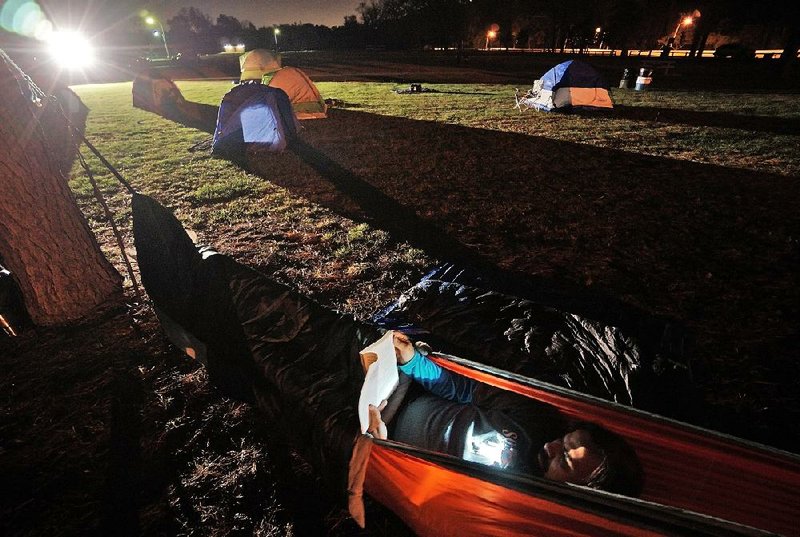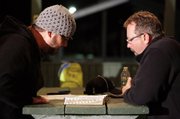Roughly 20 people who camped Friday night near the Arkansas River to get a feel for how the homeless live awoke to coffee and fruit, but also with tired eyes and fresh insight after hours of tossing in the chilly air.
"The whole point is to be uncomfortable. It worked," said Chris Owen, 39, who added that he now appreciates why the homeless people he attends to at a health facility tend to doze off.
The inaugural Sleep Out in the Rock took place less than three months before the next biennial tally of central Arkansas' homeless population. The last few counts have shown a steady decline in the region, but more than 800 people are estimated to be homeless on any given night, with more than 300 not sleeping in a shelter.
At least two dozen homeless shelters offering more than 1,000 beds operate in Pulaski County, according to lists maintained by the Arkansas Department of Human Services and Central Arkansas Team Care for the Homeless. Millions of dollars in federal grants and donations are spent each year to combat the problem, but some of the barriers between the homeless and permanent homes remain difficult to overcome.
The Little Rock day resource center Jericho Way organized the campout at the city's Murray Park as a way to raise money and awareness of homelessness. Outside organizations sponsored some of the participants by paying the $500 per-spot cost for one night in the elements.
Jericho Way program director Sister Elizabeth Greim told participants the event was designed for them "to have that night of discomfort when you can say, 'When I feel it, it's amplified 365 days, four [years or] five years,' to have those moments when you can have empathy and understanding."
Depaul USA, which addresses homelessness in six cities, has operated Jericho Way since spring 2015. Little Rock contributes $350,000 a year toward the operational costs, which typically run more than $400,000 per year, Greim said.
Jericho Way has placed 27 people in public housing over the past 18 months, Greim said. On a day-to-day basis, the center tries to help homeless people achieve incremental goals toward getting off the streets.
One of the toughest challenges for the center's incomeless clients is obtaining documents like birth certificates or identification cards that are necessary to obtain state aid, open bank accounts, secure jobs or rent apartments, Greim said.
"That's a big gap in services," Greim said. "That became very apparent to us as we began to watch people try to access services."
Most campers on Friday wrapped themselves in sleeping bags inside tents and rested their heads on pillows. They weren't fully insulated from temperatures that dipped into the 40s, however, and they spoke of difficulty getting sound sleep on the uneven park ground.
Honking geese, passing barges, howling coyotes and noisy cars were among the overnight distractions, until sleep became involuntary rather than a choice.
"Eventually I got tired, and I had to sleep," Robbie Hunt said.
It was an issue Greim called attention to Saturday morning as campers gathered underneath a pavilion to reflect on the night. She said people who sleep outdoors often wake up dazed or hyper-excited after adrenaline is triggered several times throughout the night.
But many awful aspects of being homeless were absent from the gathering, which was not designed to be a full simulation of the experience. Such events sometimes strip participants of cellphones and extra blankets, for example, and can last longer than the 12-hour Little Rock event.
For Roland Meyer, 51, who spent more than four years without a home, those nights were constant. Meyer, who is blind in his right eye and recently learned he had the early stages of glaucoma in his left eye, rarely slept in a shelter, he said. On Friday night, he required an escort to find his way around the park after the sun set.
Meyer moved into a public housing complex Monday. Jericho Way donors are covering the $50 monthly rent for Meyer, who remains without income while he seeks disability assistance.
"He was our test case for someone who has no income," Greim said.
When Amy Dreiling was homeless, she had only one of her two contact lenses and suffered frequent headaches. She now has eyeglasses after free assistance and lives with her fiance, Christopher Haynie, in a North Little Rock apartment.
Haynie spent nearly one year without a home after being released from a youthful-offender lockup, he said. He had a daily routine of going from one resource to the next as he struggled to get an ID card, but often feared being robbed or assaulted at night while he slept.
People who are homeless know they must wake up early each day to start getting help from the network of resources and avoid police who won't let them sleep in public, Haynie said. They find places throughout the city to hide their belongings so they don't have to carry them everywhere, he said.
Most central Arkansas shelters operate on eligibility restrictions, such as treating only children, military veterans, people who use narcotics or victims of domestic violence. They also allow varying maximum stays, from several days to two years or more. Most services and overnight stays are free, but not all of them.
Every two years the Central Arkansas Team Care for the Homeless organizes a count of the homeless population in Pulaski, Saline, Lonoke and Prairie counties in accordance with U.S. Department of Housing and Urban Development rules. In January 2015, the population was 830, down 22 percent from 2013. Of those counted, 339 were unsheltered.
Ben Goodwin, president of the organization, credited an improving economy and efforts of regional shelters and resource centers for driving down the numbers but said work remains on both fronts.
"Our housing programs are consistently full and have been for years," said Goodwin, who also works for the shelter Our House, which provides 80 beds for men and women for up to two years. "We have every bed full almost every night, and we have to turn people away every single day. We know the need out in the community is great."
Campers on Friday night were fed beef chili, black beans and cornbread prepared by Jericho Way cook Noel Porter, who doles out about 2,000 meals a week made from donated food.
Earlier that day at the Springer Boulevard facility, for example, Porter served a medley casserole made of leftover sirloin beef vegetable soup and chicken noodles. "I don't waste anything," Porter said.
When the Murray Park campers awoke Saturday morning, they were offered fruit, muffins and coffee.
Some said they realized they had an advantage after being startled by environmental noise through the night.
"We knew we were safe because the police were here," Hunt said. "We were privileged."
Metro on 11/06/2016

